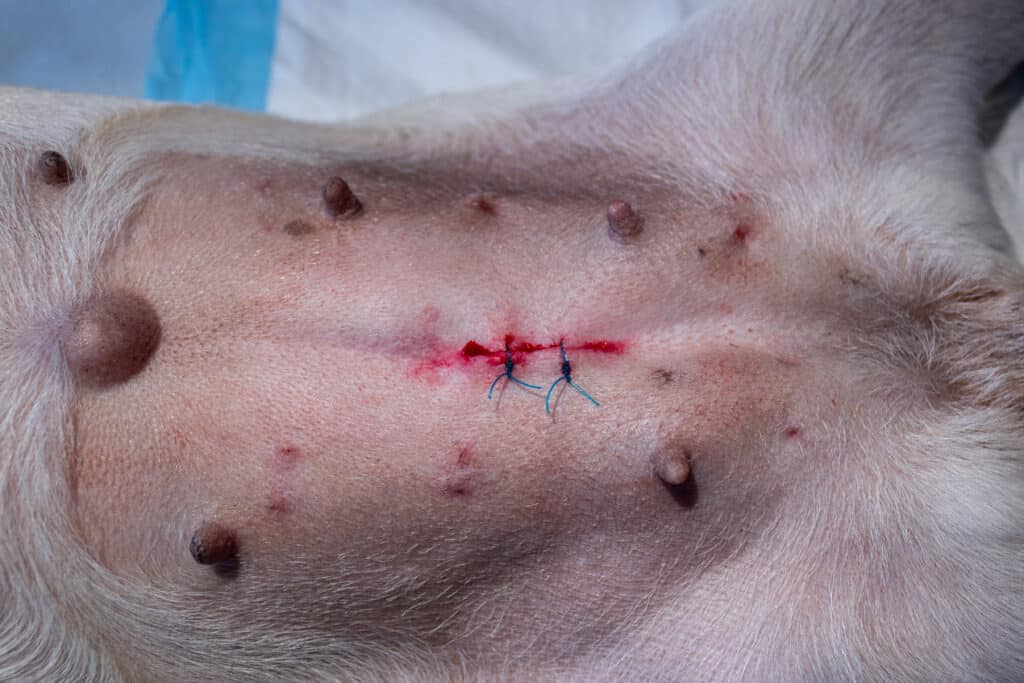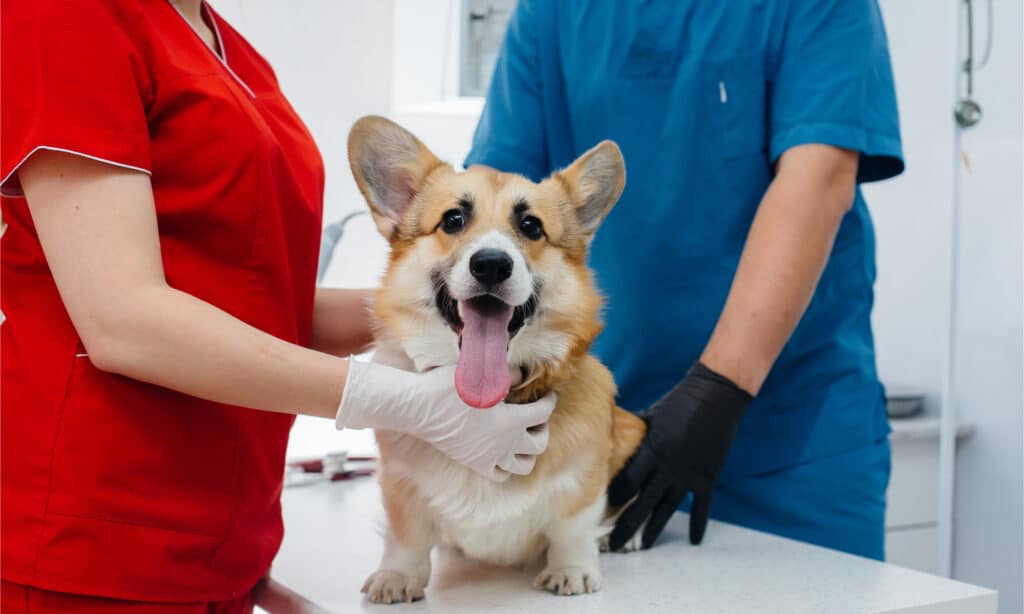Dog hernias could be congenital, the result of trauma, or some other medical condition. There are different types of hernias, which determine the specifics of treatment. When surgery is indicated, your pup will spend some time at the vet. Learn about dog hernia surgery prices in 2024, including the cost for the procedure and any associated recovery costs.
What Is a Dog Hernia?
When a hernia is present, it means your pup’s organ (sometimes tissue) has pressed against the muscle wall and protrudes into another place in the body like an uninvited visitor sticking their head in to scope out the space. Though common, these are not natural placements and they require treatment. The American Kennel Club confirms that some hernias may be life-threatening, so prompt veterinary attention for assessment is required. There are a total of five types of dog hernias, and they include the following:

There are five different types of hernias (the one pictured above is a sutured incision after an umbilical hernia repair).
©Topolszczak/Shutterstock.com
- Inguinal Hernia: This dog hernia is located in the groin area of pups. You can spot these hernias because they bulge outward right in the crevice where your dog’s leg reaches its belly.
- Perineal Hernia: This hernia is located in your pup’s lower abdomen. It becomes obvious when there’s swelling around the anus. This swelling occurs because the organs have pushed through.
- Hiatal Hernia: This dog hernia is located in the part of your pup’s body where the stomach connects to the esophagus. It’s where the diaphragm opens. With a hiatal hernia, your pup’s organs may protrude in an unnatural way through the diaphragm’s entry.
- Diaphragmatic Hernia: The name gives it away, but this dog hernia is located in the diaphragm, which causes your pup’s abdominal organs to shift into a place they’re not supposed to be: the chest cavity.
- Umbilical Hernia: This hernia is located in your dog’s belly button (formally known as the umbilicus). This hernia bulges on your pup’s tummy area, just under the rib cage.
What Does a Dog Hernia Procedure Entail?
The dog hernia procedure is a bit different depending on the type of hernia your dog has. But there are some general processes that are followed, no matter the type of hernia. To start, your dog will need to be anesthetized. Once this process is complete, your vet will properly position your pup so the hernia is accessible.
Next, your vet will move on to shave and clean the area to prepare for the incision. Once prep is complete, it’s time for surgery. First comes the incision so your vet can access the area. Once they see the hernia, they remove the necrotic tissue and repair the muscle layers. They check the abdomen for bleeding and they close the incision once the procedure is complete.
Dog Hernia Procedure: Costs

It’s always a good idea to have pet insurance for accidents and illnesses.
©Andrii Medvednikov/Shutterstock.com
The costs for dog hernias vary, depending on several factors. The location of the hernia plays a part in the cost but so does the location you live in. The cost of living affects how much a veterinary office charges for surgery. On average, however, you can expect to pay $1,600 for a dog hernia surgery. Sometimes, the case is more complex and when that’s the case, the cost rises (sometimes up to $2,500). On the lower end, a dog hernia surgery can cost about $700.
Not everyone can afford these unexpected veterinary expenses, which is why pet insurance is so vital. It can help you make a split-second decision with peace of mind, knowing you’re getting your dog the help it needs and knowing you don’t need to absorb the financial impact of vet care.
How Long Does Recovery After a Dog Hernia Take?
Typically, your dog will recover after dog hernia surgery in 10 to 15 days. During this time, your pup needs an Elizabethan collar to prevent it from licking at and irritating the incision site. Typically, dogs don’t require hospitalization following a dog hernia surgery and are discharged the same day. It’s your responsibility to keep your pup as still as possible while the incision heals.
Your vet will send you home with pain medication and instructions for aftercare. Your vet may need to see your dog once more to remove any sutures. While your pup is healing at home, you are also responsible for monitoring the incision site to check for any signs of infection.
Dog Hernia Recovery: Costs
An Elizabethan collar may be as low as a couple of dollars but there are different styles, some of which are more comfortable than others. You may spend up to $40 for some of these more comfortable options. The pain medication prescribed by your vet varies but it’s typically between $10 and $15. Depending on your vet, there may or may not be a charge for the follow-up appointment.
The photo featured at the top of this post is © Juice Flair/Shutterstock.com
Ready to discover the top 10 cutest dog breeds in the entire world?
How about the fastest dogs, the largest dogs and those that are -- quite frankly -- just the kindest dogs on the planet? Each day, AZ Animals sends out lists just like this to our thousands of email subscribers. And the best part? It's FREE. Join today by entering your email below.
Thank you for reading! Have some feedback for us? Contact the AZ Animals editorial team.







